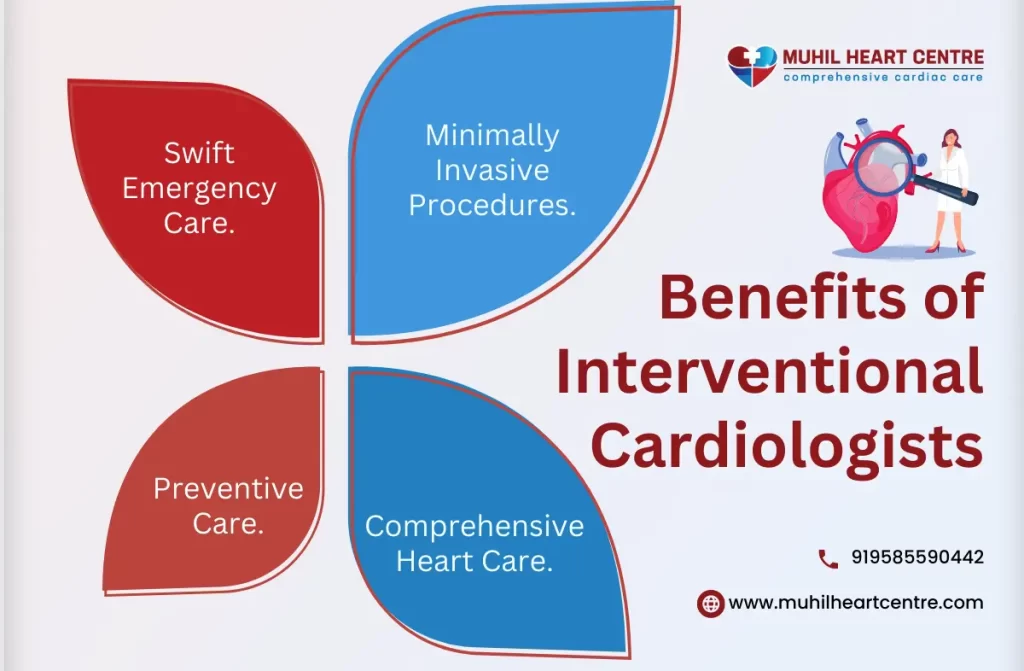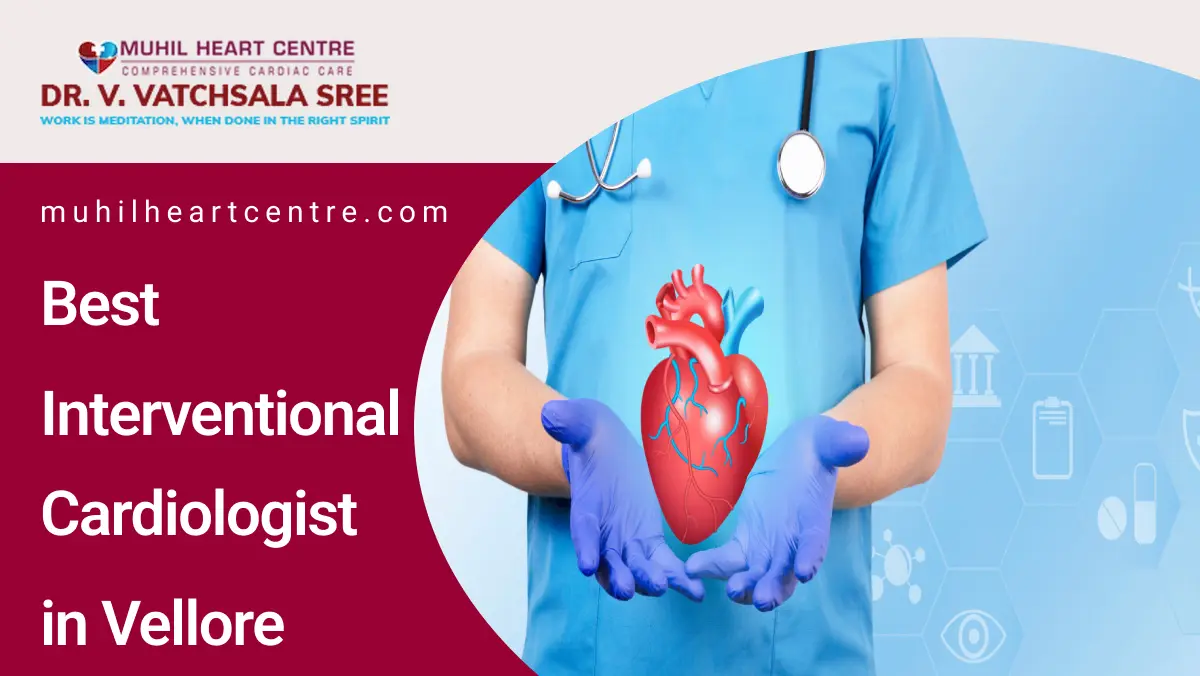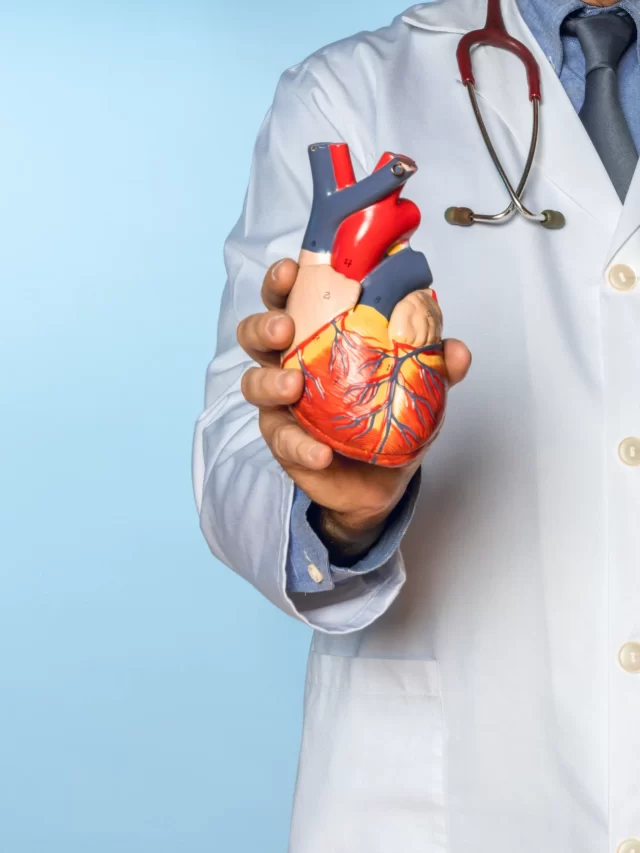Cardiovascular diseases remain a leading cause of mortality worldwide, highlighting the vital role of interventional cardiologists in managing various heart conditions. At Muhil Heart Centre, we have the best interventional cardiologist in Vellore who has the expertise to diagnose, treat, and prevent a wide range of cardiovascular disorders, making them a crucial part of modern healthcare.
In this article, we will explore the responsibilities of interventional cardiologists, the conditions they treat when to approach them, their diagnostic testing procedures, the advanced treatments they offer, and the benefits of seeking their care.

Who are Interventional Cardiologists?
Interventional cardiologists are medical professionals with extensive training in both cardiology and interventional procedures. The experts of interventional cardiology in Vellore are specialized in catheter-based techniques to diagnose and treat various heart conditions. Unlike general cardiologists who primarily focus on non-invasive diagnostic methods, interventional cardiologists possess additional expertise in performing minimally invasive procedures to address complex cardiovascular issues.
Conditions Treated by Best Interventional Cardiologist in Vellore
The best interventional cardiologist in Vellore is equipped to manage a wide array of cardiovascular conditions, including but not limited to:
- Coronary Artery Disease (CAD): The most common heart condition, CAD occurs when plaque builds up in the coronary arteries, leading to reduced blood flow to the heart muscle. Interventional cardiologists can perform procedures like angioplasty and stent placement to open blocked arteries and restore blood flow.
- Myocardial Infarction (Heart Attack): In case of a heart attack, immediate intervention is critical. Interventional cardiologists can swiftly perform emergency angioplasty to reopen the blocked artery and minimize heart muscle damage.
- Peripheral Artery Disease (PAD): PAD involves the narrowing of arteries outside the heart, usually in the legs. Interventional procedures can help restore blood flow and alleviate symptoms like leg pain and cramping.
- Valvular Heart Disease: Interventional cardiologists can repair or replace malfunctioning heart valves using transcatheter techniques, avoiding the need for open-heart surgery in some cases.
- Congenital Heart Defects: Some structural heart abnormalities present since birth can be treated with interventional procedures, reducing the need for invasive surgery.
When to Approach an Interventional Cardiologist?
It is essential to consult the best interventional cardiologist in Vellore in various situations:
1. Chest Pain or Discomfort: Persistent or recurrent chest pain may indicate underlying heart problems and should not be ignored.
2. Shortness of Breath: If you experience unexplained shortness of breath, especially during physical activity, it could be a sign of cardiovascular issues.
3. High Blood Pressure (Hypertension): Chronic high blood pressure requires careful management to prevent heart-related complications.
4. Abnormal Heart Rhythms (Arrhythmias): Irregular heartbeats or palpitations may warrant evaluation by an interventional cardiologist.
5. History of Heart Disease: Individuals with a family history of heart disease or personal history of cardiovascular issues should regularly consult an interventional cardiologist for preventive care.
Diagnostic Testing Procedures of Interventional Cardiologist
Interventional cardiologists are specialized cardiologists who perform minimally invasive procedures to diagnose and treat cardiovascular conditions. Here are some common diagnostic testing procedures associated with interventional cardiology:
Coronary Angiography:
Purpose: To visualize the coronary arteries and assess blood flow.
Procedure: A contrast dye is injected into the coronary arteries through a catheter, and X-ray images (angiograms) are taken to identify blockages or narrowed areas.
Angioplasty (Percutaneous Coronary Intervention – PCI):
Purpose: To open narrowed or blocked coronary arteries.
Procedure: A catheter with a balloon at its tip is advanced to the narrowed area; the balloon is inflated to widen the artery, and often a stent is placed to keep the vessel open.
Fractional Flow Reserve (FFR) Measurement:
Purpose: To assess the severity of coronary artery blockages.
Procedure: A pressure-sensitive guide wire is threaded through the coronary arteries to measure blood pressure on either side of a blockage, helping determine the need for intervention.
Intravascular Ultrasound (IVUS):
Purpose: To provide detailed images of the inside of coronary arteries.
Procedure: A tiny ultrasound probe is inserted into the coronary arteries through a catheter to generate high-frequency sound waves, producing detailed images of vessel walls and blockages.
How to Choose Interventional Cardiologist in Vellore
Choosing the right interventional cardiologist in Vellore is an important decision for your cardiovascular health. Here are some steps to help you make an informed choice:
Ask for Recommendations
Start by asking your primary care physician, friends, family, or colleagues for recommendations. They may have had positive experiences with a cardiologist or know someone who has.
Check Credentials
Ensure that the interventional cardiologist is board-certified and has the necessary qualifications and certifications. You can often find this information on the hospital or clinic’s website or by contacting the medical board in Vellore.
Research Experience and Specialization
Look into the cardiologist’s experience and specialization in interventional cardiology. Consider how many years they have been practicing, the number of procedures they have performed, and their success rates.
Insurance Coverage
Check whether the interventional cardiologist accepts your health insurance. This can help minimize out-of-pocket expenses.
Ask Questions
When you schedule an appointment, take the opportunity to ask questions. Inquire about the cardiologist’s approach to patient care, their communication style, and what to expect during and after procedures.
Diagnostic Testing Procedures
Interventional cardiologists employ various diagnostic tests to assess heart health, including:
- Angiography: This imaging technique is used by the best interventional cardiologist in Vellore as it involves injecting a contrast dye into the blood vessels and using X-rays to visualize blockages or narrowing in the arteries.
- Echocardiography: Using sound waves, echocardiography creates images of the heart’s structure and function to detect abnormalities.
- Electrocardiogram (ECG/EKG): An ECG records the heart’s electrical activity and can help diagnose arrhythmias and other heart conditions.
- Stress Testing: This is used for interventional cardiology in Vellore to evaluate the heart’s response to physical stress, identifying potential issues that might not be apparent during rest.
Advanced Treatments Offered by Interventional Cardiologists
In the department of interventional cardiology in Vellore, the interventional cardiologists employ cutting-edge procedures to treat heart conditions:
- Angioplasty: During this procedure, a catheter with a deflated balloon is threaded into the blocked artery. The balloon is then inflated to widen the artery, and a stent may be placed to keep it open.
- Stent Placement: Stents are small mesh tubes that help keep arteries open and improve blood flow to the heart.
- Atherectomy: This procedure provided by the best interventional cardiologist in Vellore involves using a rotating blade to remove plaque from arteries.
- Transcatheter Aortic Valve Replacement (TAVR): A less invasive alternative to open-heart surgery, TAVR involves replacing a damaged aortic valve with a prosthetic valve using a catheter.
Benefits of Approaching Interventional Cardiologists
Seeking care from the best interventional cardiologist in Vellore offers several advantages:
- Minimally Invasive Procedures: Many interventions can be performed through small incisions, reducing recovery time and complications.
- Swift Emergency Care: During heart attacks, interventional cardiologists can quickly restore blood flow, minimizing heart damage.
- Comprehensive Heart Care: They provide a wide range of diagnostic and treatment options tailored to individual patient needs.
- Preventive Care: Interventional cardiologists emphasize preventive measures to manage risk factors and prevent future heart problems.
Conclusion
To conclude, you can approach Muhil Heart Centre as this clinic is equipped with the best interventional cardiologist in Vellore who are experts in diagnosing, treating, and preventing various cardiovascular conditions. Their expertise in minimally invasive procedures allows for swift and effective interventions, significantly benefiting patients’ heart health. Regular check-ups and timely consultation can ensure optimal heart care and improved quality of life.
Read also Best Exercise for the Heart.


